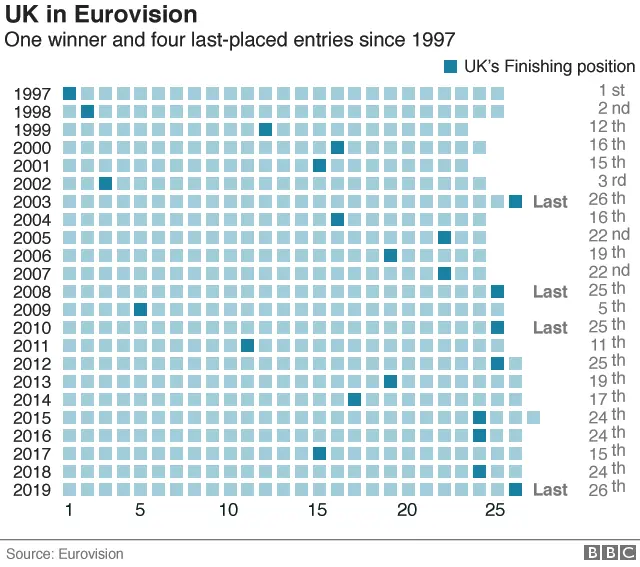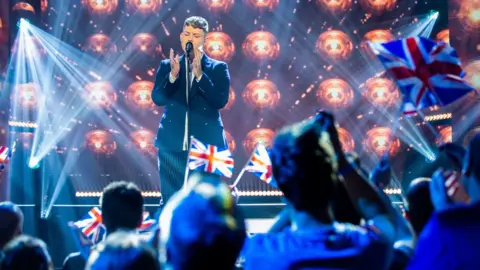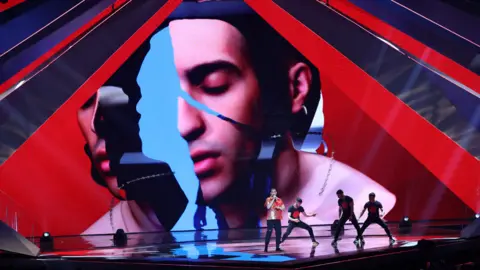Eurovision: Is Brexit to blame for the UK's latest flop?
 Reuters
ReutersThe UK finished in last place at Eurovision on Saturday, despite the best efforts of singer Michael Rice. The talent show winner has reportedly blamed a Brexit backlash, as have some disgruntled British Eurovisionophiles.
Rice told The Sun that even Gary Barlow or Elton John would have finished last this year.
But it's now a decade since the UK has earned a place in the top 10 and more than 20 years since the last win - a losing streak that stretches back long before the EU referendum was a twinkle in David Cameron's eye.
So can we really blame politics? And what other factors are at play? Here are five possible reasons the UK flopped - and keeps flopping.
1. Brexit
If Europe thought the UK was sticking up two fingers in its direction when the 2016 referendum happened, it's logical to think this could be Europe's way of sending the same message back.
Allow X content?
Allow X content?

But the UK was also doing terribly before the Brexit vote.
- Average UK position at Eurovision in the three years before the EU referendum: 22nd
- Average UK position at Eurovision in the three years since the EU referendum: 22nd
Some people trace the UK's apparent unpopularity back further.
TV critic Kevin O'Sullivan said: "It's because we invaded Iraq. It's because of Afghanistan. To the participants in the Eurovision Song Contest, we're the nearest thing we've got to America and they hate us."


But the politics are a red herring, according to The Spectator editor and Eurovision enthusiast Fraser Nelson.
He told BBC News: "It's tempting for us Brits to blame politics or Brexit when we flop in Eurovision, but we have to face the facts here. Politics didn't help the Dutch win - they had a superb song and we just didn't.
"As long as Britain keeps blaming politics for our Eurovision failure, we're going to keep falling flat on the world's largest musical stage and we're going to keep sending entries that are visibly worse than those submitted by countries a tenth of our size."
2. The selection process

As the dust has settled after Saturday's contest, there have been calls for the BBC - which runs the UK selection process - to up its game.
"If we want to win as a country, we have to put more resources behind it," Grammy-winning record producer Steve Levine told BBC Breakfast.
Nelson agreed, saying the corporation needs to take the contest more seriously - with funding to match. Most other top countries have a more rigorous and competitive selection process with more songs to choose from, he explained.
"I think the BBC ought to ask whether it's sufficiently committed to Eurovision to keep doing this," he said. "Britain puts in less effort than the vast majority of countries when it comes to how many heats you do. You get out of this what you put into it."
The Netherlands won on Saturday after a 44-year barren spell, and Eurovision expert Paul Jordan said they had turned their fortunes around after getting record labels involved.
"The team from the BBC really try hard, but without the record companies' involvement you're not going to get the great songs and songwriters coming through."
3. The talent
Allow Google YouTube content?
However, great British songwriters and performers don't want to touch Eurovision with a bargepole, partly in case they flop too and partly... because it's Eurovision.
"People are not applying and putting their best songs in because they don't want to be associated with Eurovision," superfan Will O'Regan told BBC Breakfast.
That wasn't always the case. Acts like Sandie Shaw and Cliff Richard were already stars when they participated in the 1960s.
"We need to look at where the songs are coming from," Levine said. "Traditionally, it was people who were at the top of their game. We need to make sure we're getting the songs from the very finest professional songwriters, and we get their A-list songs."
Nelson added: "Britain is the only country in Europe that's a net exporter of music.
"We are just dripping in musical talent here and to see us on the world's most-watched non-sporting event sending in songs that do not reflect any of our national talent, it's embarrassing because we can do so much better."
4. The song
Rice's entry Bigger Than Us was actually written by John Lundvik, who competed for Sweden this year.
London-born Lundvik co-wrote two songs, but he, his management and record company decided to go with Too Late For Love - which took him to sixth place.
Rice got the other one. "I thought the song was just very boring, and I thought it sounded very old fashioned," comedian and radio host Ayesha Hazarika told BBC Radio 5 Live. "He was like a wee guy who lost his boy band."
And what is bigger than us precisely? Its lyrics are pretty generic, whereas The Netherlands' victor Duncan Laurence was inspired to write his winning song, Arcade, about a loved one who died young. The previous year, Netta won with another song that meant a lot to her - albeit in a very different way.
YouTuber and Eurovision fan Alesia Michelle said it helps if an artist has a personal connection to their song. "At the end of the day that's what makes the difference," she told 5 Live.
"People at home are going to know you're truly connected to the song you're singing, and I think that's truly why Duncan ended up winning - because it wasn't just a good pop song, it wasn't [just] something that was catchy, it was something that truly felt authentic to him and it was a story he could get on the stage and sell because it was real to him."
UK jury spokesman Rylan Clark-Neal told the BBC's Eurovision Calling podcast that Rice gave "one of the best vocals in the competition", but wasn't helped by the song's slow start.
"I'm not sure if it was the sound or what it was, but I thought the beginning was extremely quiet, the vocals," he said. "That first 10 seconds are all about viewers at home [thinking], am I going to grab another drink? Am I going for a wee?"
Meanwhile, writer Kit Lovelace analysed the last 20 winners and losers, and found that winners were more likely to be in a minor key, and last-placed songs were more likely to be in a major key. Bigger Than Us was in C major.
And The Guardian's Martin Belam pointed out that things started going downhill for the UK in 1999 - the year the rules changed to allow other countries to sing in English, which may have removed an advantage for the UK (and Ireland).


5. The semi-finals
 EPA
EPAAs one of the "big five" countries that contribute the most funds for the contest, the UK doesn't have to compete in the semi-finals and goes straight to the final.
But that's not always an advantage. Of the big five, Italy is the only country that has not consistently underperformed.
Average positions of the big five in Eurovision finals since 2011
- Italy - 8th
- France - 17th
- Germany - 18th
- Spain - 20th
- UK - 21st
Perhaps the big five are at a disadvantage because fans aren't so familiar with their songs, or because the acts haven't had the extra practice of the semi-final. Or perhaps fans resent the fact they get a free pass.
Nelson said it had "made us lazy over the years" because the UK had not been forced to qualify from the semis.
"We haven't worked out just what a sophisticated operation Eurovision is - that you need choreography, you need staging, you need a very different song that will cross all of these linguistic boundaries," he said.
But things could all change quickly if the UK decided that this year's experience was a humiliation too far, he added.
"If we want to properly join this contest and put in as much effort as some other European countries... if we were to properly try, then we could get back in the top 10 next year.
"We could win next year if we wanted to."

Follow us on Facebook, on Twitter @BBCNewsEnts, or on Instagram at bbcnewsents. If you have a story suggestion email [email protected].
